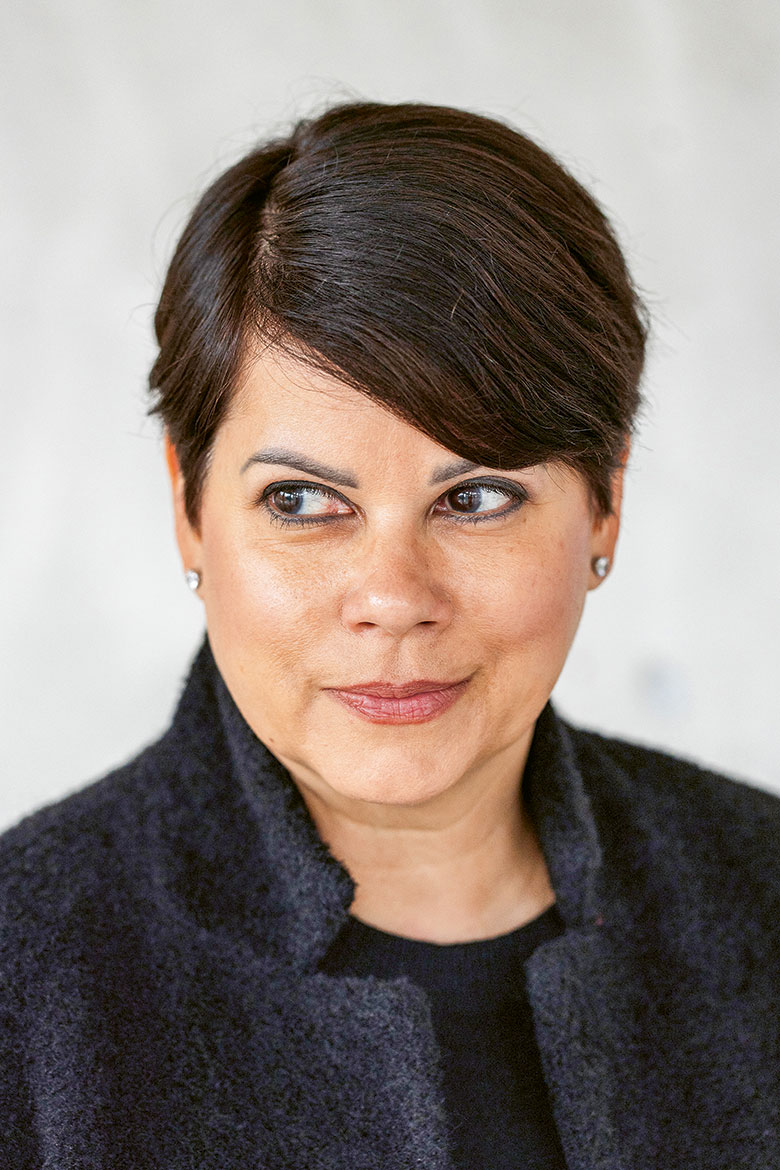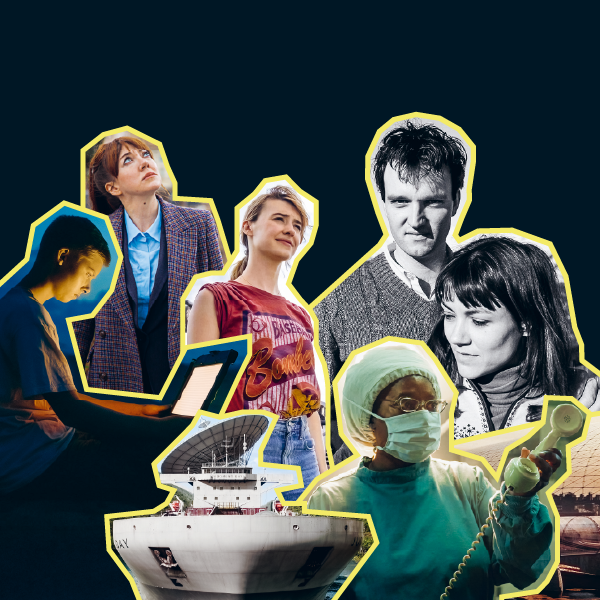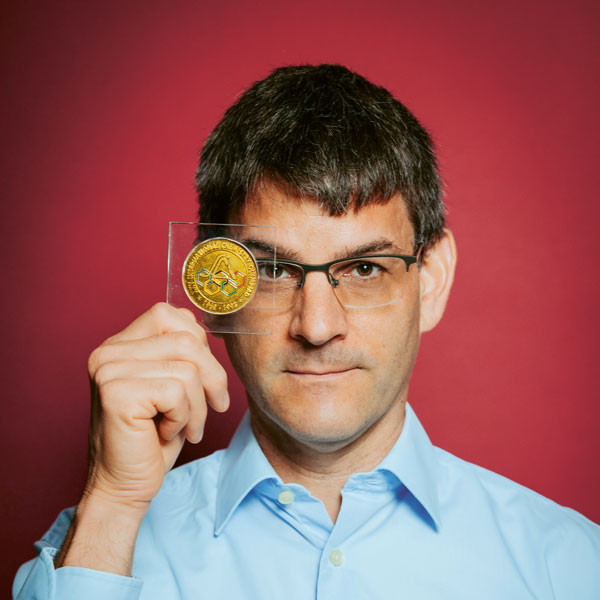portrait
Undaunted between business, meetings and publications
Sita Mazumder already bridged different worlds in her dissertation and developed concrete recommendations for applying anti-corruption laws. Today, the IT economist brings together the digital and business worlds. Portrait of a researcher, entrepreneur and board member who cannot be pigeonholed.

A female professor breaking barriers in the male-dominated fields of technology and economics. Sita Mazumder and her team analyse the quality of companies' data. | Photo: Gabi Vogt
“This month is going to be tough! Especially today”. The business economist Sita Mazumder takes a deep breath, then lets out a sigh. “And this despite the fact that I’ll probably be sitting on the sofa all day”. She gives a hearty laugh. She’s got calls lined up until the evening. She replied to our invitation to this interview shortly after five in the morning. When she’s working from home, she likes it best when sitting comfortably on her couch with a paper notebook in front of her and a box full of pens, lined up symmetrically. She is “overly tidy”, she says, “because I’m too stupid to be chaotic”. She grins. If disorder ever did take over, she’d take fright. Then she’d really be swamped.
It’s no wonder that each of Mazumder’s days is packed with duties that would normally fill three for anyone else. After all, she wears three hats. She is a professor who teaches and researches at the Lucerne University of Applied Sciences and Arts (HSLU); she’s an entrepreneur who runs her own consultancy; and she’s a member of management and supervisory boards, offering her expertise to corporate management. “These three areas – academia, entrepreneurship and boards – are mutually beneficial”, she says.
High-speed studies
Sita Mazumder is a professor at the Lucerne University of Applied Sciences and Arts (HSLU), where she heads the Digital Business Development Lab. She studied computer engineering at ETH Zurich and then economics at the University of Zurich, completing her studies in the shortest possible time, despite also having an 80-percent job at a bank. She then completed a doctorate at the Swiss Banking Institute in just two years. Her thesis was also awarded the University of Zurich’s annual research prize. She runs her own company, advising businesses on strategy, and she also sits on numerous boards of directors and supervisory committees.
They don’t get in each other’s way; of that she is insistent. “I keep these jobs strictly separate”. If she’s active in a specific company where an employee has a concrete idea for a research project, then she’ll recommend other researchers for it, and recuse herself. “Unless they explicitly request that I should be involved. But then it has to be made appropriately transparent in the research project. Also to protect myself, to maintain my freedom and independence”.
Applying anti-corruption laws in practice
In her research, Mazumder is busy with phenomena related to new technological possibilities. At present, she’s focusing primarily on artificial intelligence and digitalisation, but also on topics such as cybercrime, money laundering, corruption and financing terrorism. Since she was a doctoral student, she has been focusing very much on applied research in these areas. The title of her doctoral thesis was: ‘Prudence in Swiss Banking; the Prevention and Eradication of Corruption and Corruption Money Laundering’.
Mazumder’s approach was new at the time because she was developing concrete recommendations for how economists should deal with newly introduced corruption laws. Prior to this, it was mostly lawyers who had dealt with the topic. “I wanted to know: what does this mean for business processes in concrete terms? What can we do to comply with the law while achieving an optimal structure? Many found this unnecessary and advised me against the topic”. But she got her way, and continued on her unusual path, deliberately choosing to work at a university of applied sciences. “This was because I didn’t want to work in basic research. I wanted to engage in applied research with companies and in projects that had a direct impact on the economy”, she says.
As a woman in the boys’ club of technology and business, Mazumder has had to put up with all kinds of comments. Such as being asked why a “nice girl like her” wanted to deal “with such difficult topics”. Or being asked at an event if she could serve the coffee, where it was inconceivable to some that this young woman wasn’t a menial assistant.
Even winning the University of Zurich’s annual research prize for her doctoral thesis did not go unremarked-upon: “A colleague asked me with whom I’d had an affair so that I could win it”. Several years ago, Mazumder co-edited a book series about the careers of women. “A lot of stereotypes still persist, even today. That’s something that I wanted to analyse”.
Looking back today, she says: “My otherness was very much reduced to my gender. But for me, that’s just one aspect of many. Today I actively advocate for conscious diversity. As a result, I mediate between generations, between economics and IT, between the nerds and the suits. Be nice to nerds!” She laughs out loud.
Sometimes it’s challenging, she says, when she changes her jeans for a trouser suit, moving between her different worlds. But her projects can only succeed if she and her partners engage eye-to-eye as equals. “If at the age of 54 I’m the youngest person on a company board, then I’ll do my best to change things. Otherwise we would be ignoring what’s happening in society at large”.
From a target of bullies to an exotic favourite
Mazumder stands out from the crowd, and she is liked by the media. She is regarded as a role model for how a woman can succeed in a field dominated by men – and a woman with an immigrant background, no less. The media have labelled her a ‘high-flyer’, ‘wonder woman’, even ‘superwoman’, but she’s got no desire to read such comments any more.
“They are compliments, but I don’t recognise myself in them. Not everything has gone according to plan, and not everything has worked out. I just have fun doing what I do. That’s why I put a lot into it, even if it’s sometimes stressful or irksome. All the same”, she adds cheerfully, “positive stress is something you can manage. Days, even months of it will pass. All things must pass”.
All things must pass? That’s a useful mantra from her childhood. More than is probably the case with other researchers, it’s in her childhood that we can find the origins of Mazumder’s career as a bridge-builder. She grew up in ‘darkest’ Aargau in the 1970s, before the advent of the Internet, at a time when artificial intelligence was wreaking havoc only in science-fiction stories. As the daughter of a dark-skinned Indian and a light-skinned mother with French roots, she didn’t fit in at kindergarten or primary school. Perhaps that’s why she decided that she was really going to show them. As Mazumder recalls, “They’ve locked you in the locker, and you’re waiting in the dark? It’ll pass. They beat you up in the schoolyard? It’ll pass too. They write: ‘Sita’s skin looks like dirt’? It’ll pass”.
At high school, suddenly, things turned around. “As a teenager, I was admired for being exotic”. She learnt that criticism can change, as can praise. “But I am who I am. If you become everyone’s darling, that’s no reason to get big-headed. And if you suffer a setback, don’t let it get you down. It makes you independent, humble, and down to earth”.
Taking off
Finally, she took off – literally. At the age of 16, she plucked up all her courage, stuck a cushion behind her back so that she could reach the pedals with her feet, and learned to fly a plane. “I was 1.53 metres tall with a cushion propping me up. But I still managed to get my private pilot’s licence. You simply have to go for it”.
Mazumder continues to tackle new things – even today. At present, she’s helping to set up the Digital Business Development Lab at HSLU. “We’re like a carpenter spider: the body comprises a small, core team of AI experts, while the long legs lead off to other labs and partners, depending on the project. This means we can be flexible and tailor-fit whatever we do. We launched it in September”. Their aim is to support businesses in dealing with technologies.
One of Mazumder’s concrete upcoming projects is in the healthcare sector. “This project is typical of many in the field of AI. I can observe the same phenomenon there that I have observed as a company board member and as an entrepreneur. People have the wrong notions about how much data you need, and in what quality, in order to achieve the goals they’ve defined. They become convinced that they have a treasure trove of data, but then they realise, regrettably, that all they have is a pile of sand”. So Mazumder and her team sift through the data with a specific case in mind – perhaps for a specific company – and get their systems to learn accordingly.
Data and algorithms are one thing, but people and their fears of change are quite another. “You have to carry people along with you on your journey. You have to look them in the eye and ask them: What motivates you? What’s holding you back?” Her lab is also intended to support her in this. And perhaps her own experiences will help, along with her mantra “All things must pass”. You just have to be courageous, be open, and stay true to yourself.




